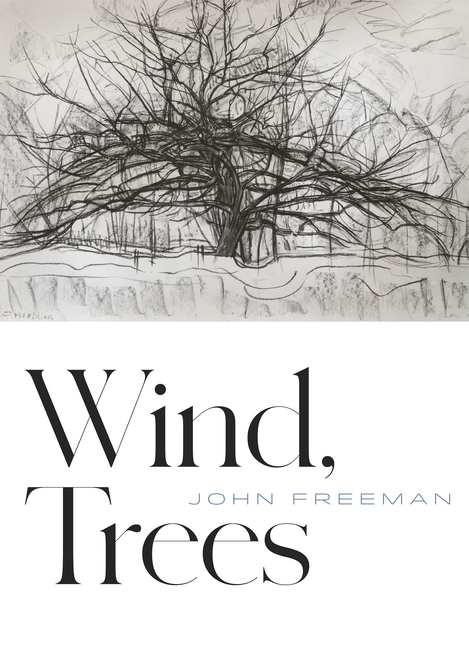Praise for Wind, Trees"Urgent, descriptive, plainspoken, hard-edged–a glasswork of facts–the poetry of John Freeman seems to come from a place of intense inner weather, and his latest book,
Wind, Trees, is a gust from that interior world, which is a version of your world or mine. I mean to say his style is subtle, but sharp as corners. The poems have a tough quality, a perspective that seems watchful, but always from the edge of things, looking in. They are nervy and aware."–
Jesse Nathan, McSweeney's"The central place, in life, of openness and learning–from truths hard won to the great mysteries on the horizon–is what most animates this book. . . .
Wind, Trees clearly cares about the natural world and our place in it, our human relations to the elements and the animals, the damage we've done. A title like 'The Heat Is Coming' hardly needs a poem at all. But Freeman makes no human claims on nature nor even really on nature's behalf, refusing to speak with any certainty for anything as grandly mysterious and loving as a forest, which speaks its own languages. . . . Still, much remains to be learned in these poems of middle age, of and from nature, of and from our human mentors–those Barry [Lopez] would call our elders–of and from a book bound by the irreconciled tension between one thought ('Maybe one day I will learn how to live') and another ('how badly I want')."–
Scott Korb, Los Angeles Review of Books"Following his urbane ruminations in his last collection,
The Park (2020), Freeman's observations about humanity's impacts on the natural world and the resulting spiritual conundrums remain sharp. His lines are, at times, sublime. In 'Perfume: ' 'The tangerine seller / undressing one / fruit after the other / misting the air.' The poet reminds us that we all share the experience of wind and trees as sensual truths. These poems record sensory encounters that ask how we live with nature and with each other. What is kept, what is let go? In 'Piano, ' Freeman writes, 'Who thought to thread / a wire through the belly / of a tree'. 'The Secret Country' ruminates on a bus ride in spring, with the whoosh beneath a canopy of trees and childhood's promise. 'Dusk' is a graceful tribute to the late, influential writer Barry Lopez: 'Maybe / endless love awaits us. I know you believed so', Freeman notes, ending with 'you are free to be the wind again.' These poems encourage us to feel the lushness and beauty of what we share now."–
Raúl Nino, Booklist"What strikes me about ["Dusk"], as well as many others in the volume, is its humility. Its refreshing lack of cynicism when (for some of us, me included) cynicism has become the jerk reaction, the easy means of coping with what ails us. John Freeman instead probes the depths of human affinity and the value of guidance without over-celebrating a given poem's subject."–
Debra Gwartney, Terrain.org"When you pick up . . . John Freeman's gentle, wise poetry collection
Wind, Trees you'll see that it unfurls its imagery as part of its structure. The first half is bound by the common element wind; the second, by what the wind animates: trees. I read
Wind, Trees as a collection that looks at what brings groups to life, a spirit that you can feel whether gazing up in a reverie from the center of a stand of trees or communing with other people."–
Alta"In Freeman's ruminative, mournful, and precise follow-up to
The Park, he says goodbye to the known world while savoring everything within it, even as it burns. The poems urge the reader to slow down, the line-breaks skillfully moving against the grain of natural phrasing, leaning toward 'a world/ where imagination and remembrance are the same thing.'. . . These deep and timely meditations beautifully illuminate humanity's plight."–
Publishers Weekly"
Wind, Trees has Freeman's characteristic quietness: an understated, restrained quality which lends itself particularly well to post-pandemic writing. . . . Through exploration of form, repetition of ideas, and meandering of thought, the collection quietly stirs up issues of loss, friendship and partnership, and how to coexist in this dark yet brave new world."–
Rain Taxi
"With this collection, Freeman compels us to feel, in turns of turbulence and stillness, the longing and rage and wonder that visit anyone keenly and tenderly paying attention to the passage of human life in an uncertain landscape and time. Freeman's poems become all at once like eulogy, like instruction, like acts of love."–
Pitchaya Sudbanthad
"The poems I like most in John Freeman's new collection come in the book's second section, focused on trees. These seem to operate within the same rooted, deliberate grandeur of a grove of old-growth hardwoods. Freeman, a careful arborist, attends to each branch and leaf, describing what we might learn from the world by learning to read the messages communicated by the many vibrant living beings surrounding us."–
Orion
Praise for John Freeman"I think
of John as one of the preeminent book people of our time."–
Dave Eggers "This
second poetry collection by the editor of the biannual literary journal
Freeman'sdwells on the symbolism of places where the human and natural worlds intersect:
'A park's / purpose is to temper the machine / in us.'"–
The New York
Times "A fine
collection of spare, somber lyrics from an important figure in contemporary
writing; with this volume, Freeman steps forward for merited attention as a
poet in his own right." –
Library Journal, starred review "Perfect
to take with you to your local park bench come spring, or whenever you need to
recover a little humanity."–
Literary Hub "Atmospheric...
These meditative poems offer a thoughtful exploration on the contradictions and
connections formed in public spaces."–
Publishers Weekly "Freeman
deftly stages his urbane poems of rumination over, even celebration of, the
complexities of life... Delight and humor abound... There is wistfulness in these
poems, though they never become mired in shadows of what is lost or gone."–
Booklist "Freeman's
pensive volume is a fascinating consideration of the park as a place of
preserved wilderness... [L]ayers abound in these considerations of wild spaces."–
The
Millions "Freeman
has a strong sense of the way boundaries reflect and enforce privilege and
history, and the international devastation wrought by the pandemic make his
insightful voice all the more timely." –
The Rumpus "What is
mapped here, in John Freeman's exquisite and robust poetry debut, are the
territories of loss, pain, violence, and reckoning that make up a life. And
also those of love, remembrance, and unabashed passion that make that same life
livable. Maps is a consolation and a delight."–
Tracy K. Smith "[
Maps]
provides perhaps the best insight into the workings of a keen and compassionate
intelligence.[...] one cannot help but find the complex, near euphoric, beauty
that escapes like flares set beside a disabled vehicle on a lonely road." –
Huffington
Post




